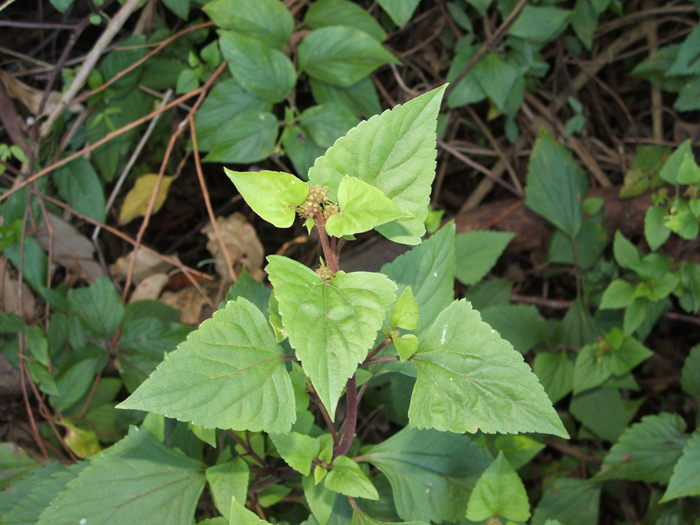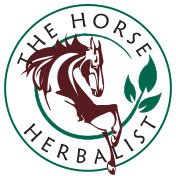Your cart is currently empty!

Crofton Weed kills Horses
Crofton weed – ( Ageratina adenophora) is beating the cane toads in it’s march south down the East Coast of Australia. It’s also now prevalent in all other states of Australia.
This plant, a native of Mexico, loves conditions in Australia and like the cane toad it has no natural predators here. Biological controls have had limited success to date and funding for research is minimal.
Crofton weed is an erect, multi stemmed perennial plant which grows to 150cm in height. It’s extremely hardly, it layers itself and will sprout from any tiny piece of root left in the ground. It relishes poor soil conditions.
It has maroon smooth stems, the broad leaves are green and have slightly dog toothed edges, it develops dense clusters of white flowers in spring.
UNTRUE
It’s untrue that horses who are being hard fed or on good pasture will not eat Crofton Weed.
It’s untrue that Crofton Weed only harms horses when it’s in flower.
TRUE
It’s true that some horses will seek out Crofton Weed even when on otherwise good pasture or hard feed.
It’s true that Crofton Weed contains an addictive alkaloid. Crush a few leaves, stem and root to smell the carrot like odour.
It’s true that Crofton Weed is harmful to horses who ingest it at all stages of the plant growth though it is thought to be at its most toxic immediately after flowering.
It’s true that every mouthful causes internal damage.
Crofton weed should not be accessible to horses. It can be addictive, it is insidious as every mouthful causes damage to the bronchioles and lung walls.
By the time physical symptoms manifest, such as cough or breathlessness, much damage has already taken place. Crofton hardens damaged cells and lung walls ulcerate and crumble so basically the horse is asphyxiated – they stand with their neck stretched and hind legs camped out, all to try and get some oxygen as the lungs start to flood. They can run blind, collapse and die. It’s a truly horrible death.
Do not work horses who are coughing or breathless, get them thoroughly checked out by a veterinarian.Any exertion increases the possibility of blowing the lungs or the bronchial tubes.
There are some useful lung/respiratory herbs for those who may be slightly affected. But if you have spotted Crofton Weed where your horses live or feed, and suspect they have or are eating, get them checked by your vet and take immediate steps to remove all plants.
Elecampane (Inula helenium) is my favourite expectorant (lung dredger), it is also bronchial-spasmolytic, it’s specific to treat bronchial asthma and cough.
Liquorice (glycyrrhiza glabra) root – not to be confused with the commercial candy (made mainly from aniseed). Liquorice extract is a bronchial vasodilator giving more expandability to airways. It works synergistically with elecampane to treat bronchial asthma and cough.
Thyme (Thymus vulgaris) – one of the best antibacterial, anti-microbial, antifungal herbs for the upper respiratory tract. Cough, sore throat, asthma.
Ask your qualified herbal practitioner to combine all three concentrated high-grade extracts only, this is the medicinal form to give best results.
Any airways dis-ease will be improved by dosing with ginger and thyme tea.
Ginger Tea – Good for upset or underactive gut, bloat and travel sickness, plus its scientifically proven to be effective against the common cold. Use the fresh root only (source from greengrocers or supermarket). Finely chop 2-3cm – add 2 cups of boiling water – let cool then pour entire contents over feed. Once daily for a time, or a few times a week dependent on condition.
Thyme Tea – brilliant herb for the entire upper respiratory tract. Coughs, colds and sore throats. Ideally use 5-10 sprigs of the fresh herb or 2 teaspoons of dried. Add to 2 cups of boiling water – let cool then pour entire contents over feed. Can give 2-3 times daily reducing dose as symptoms improve.
You can combine the ginger root and the thyme in the same tea. Great for humans too!
Author’s note:
I learnt about Crofton weed the hard way. Over 30 years ago my partner and I purchased a bush block in northern New South Wales. This was before information was readily available at your fingertips via computers. On checking out the varying herbage I was told by several local horse people that horses only ate this weed if they hadn’t any other source of fodder. Wrong. We lost a wonderful, spunky mare with an enormous will to live. She searched for Crofton having become addicted to the alkaloid. Our two other horses didn’t touch it. I was horrified at how little was known and the dis-information I was given plus the veterinary treatment of antibiotics was inappropriate. Naturally my research into this insidious weed started then.
